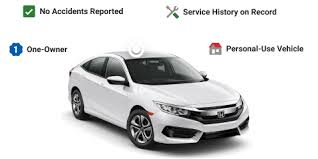Understanding Carfax and Its Role in Buying Used Cars
When purchasing a used car, one of the most critical steps is ensuring the vehicle’s history is transparent and reliable. Carfax is a widely recognized tool that provides detailed vehicle history reports, helping buyers make informed decisions. This article explores how Carfax works, its benefits, and tips for using it effectively when shopping for used cars.
What is Carfax?
Carfax is a service that compiles comprehensive vehicle history reports based on a car’s Vehicle Identification Number (VIN). These reports aggregate data from various sources, including DMVs, insurance companies, auto repair shops, and police records, to provide a detailed overview of a vehicle’s past. Key information typically includes:
- Accident History: Details on reported collisions or damage.
- Title Information: Records of salvage, rebuilt, or flood-damaged titles.
- Ownership History: Number of previous owners and duration of ownership.
- Service Records: Maintenance and repair history.
- Mileage Verification: Odometer readings to detect potential rollback fraud.
- Recalls and Liens: Open recalls or outstanding liens on the vehicle.
Carfax has become a trusted resource for both individual buyers and dealerships, offering a way to verify a used car’s condition and avoid costly surprises.
Why Use Carfax When Buying a Used Car?
Using Carfax provides several advantages for used car buyers:
- Transparency: A Carfax report offers a clear picture of a vehicle’s history, reducing the risk of purchasing a car with hidden issues like prior accidents or flood damage.
- Negotiation Power: Knowing a car’s history can help buyers negotiate a fair price, especially if the report reveals issues that may affect the vehicle’s value.
- Peace of Mind: A clean Carfax report can boost confidence in a purchase, while a detailed report with issues allows buyers to make informed decisions.
- Avoiding Scams: Carfax helps identify red flags, such as odometer tampering or title washing, where a car’s title is altered to hide its history.
While Carfax reports are not foolproof, they are a valuable tool for due diligence in the used car buying process.
How to Use Carfax Effectively
To maximize the benefits of Carfax when shopping for used cars, follow these steps:
- Obtain the VIN: Always get the VIN from the seller or dealership. It’s typically found on the driver’s side dashboard, door jamb, or vehicle paperwork.
- Purchase a Carfax Report: Visit the Carfax website (carfax.com) to buy a single report or a package for multiple vehicles. Some dealerships offer free Carfax reports for their inventory.
- Review the Report Thoroughly: Pay attention to key sections like accident history, title status, and service records. Look for discrepancies, such as inconsistent mileage or unreported repairs.
- Cross-Check Information: Use the Carfax report as a starting point, but verify details with a trusted mechanic or through a pre-purchase inspection. Not all incidents, like minor accidents or private repairs, may be reported to Carfax.
- Compare with Other Tools: Consider using alternative services like AutoCheck to get a broader perspective, as different platforms may have varying data sources.
Limitations of Carfax
While Carfax is a powerful tool, it has limitations:
- Incomplete Data: Not all accidents or repairs are reported to Carfax, especially if they occur privately or are not filed with insurance or DMVs.
- Cost: Individual reports can be expensive (around $40-$50 each), though bulk packages or dealer-provided reports can reduce costs.
- No Guarantee of Accuracy: Errors or omissions in data sources can affect report reliability.
For these reasons, a Carfax report should be one part of a thorough evaluation process, complemented by a professional inspection and test drive.
Tips for Buying Used Cars with Carfax
- Look for “Clean” Reports: A vehicle with a clean Carfax report (no accidents or title issues) is generally a safer bet, though further inspection is still advised.
- Beware of Red Flags: Be cautious of vehicles with salvage titles, multiple owners in a short period, or inconsistent mileage records.
- Negotiate Based on Findings: If the report shows minor damage or high mileage, use this information to negotiate a lower price.
- Check for Free Reports: Many reputable dealerships provide free Carfax reports for their used cars, saving you the cost of purchasing one.
- Combine with Other Checks: Pair the Carfax report with a mechanic’s inspection and a test drive to ensure the car’s condition matches the report.
Where to Find Used Cars with Carfax Reports
Carfax partners with numerous dealerships and online platforms to provide vehicle history reports. Some popular places to find used cars with Carfax reports include:
- Carfax Used Car Listings: The Carfax website offers a search tool for used cars, often including free reports for listed vehicles.
- Dealerships: Many certified pre-owned programs and reputable dealers provide Carfax reports for their inventory.
- Online Marketplaces: Platforms like Autotrader, Cars.com, and TrueCar frequently integrate Carfax reports into their listings.
- Private Sellers: While less common, some private sellers may provide a Carfax report or allow you to run one using the VIN.
Conclusion
Carfax is an essential tool for anyone looking to buy a used car, offering valuable insights into a vehicle’s history and helping buyers avoid potential pitfalls. By combining a Carfax report with other due diligence steps, such as a professional inspection and test drive, buyers can make confident and informed decisions. Whether shopping at a dealership or through a private seller, leveraging Carfax can lead to a smarter, safer used car purchase.
